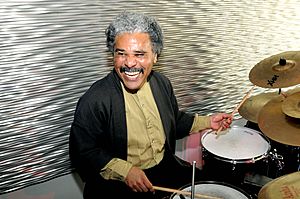Anthony Brown facts for kids

Anthony Brown playing jazz music in San Francisco in 2011
Have you ever heard a name and wondered if it was the same person you were thinking of? The name Anthony Brown is quite common, and many different people share it! This page will help you learn about some of the famous people named Anthony Brown. They are known for different things, like music, sports, politics, and science.
Famous People Named Anthony Brown
In Arts and Entertainment
Many talented people named Anthony Brown work in the arts and entertainment world.
- Anthony Brown (gospel musician) (born in 1981) is an American singer. He is famous for his gospel music, which is a type of religious music.
- Anthony Brown (jazz musician) (active from 1997 to 2018) was an American jazz drummer. Jazz is a lively and expressive type of music that started in the United States.
- Anthony Cave Brown (1929–2006) was a writer and historian. He was known for writing non-fiction books about spies and secret missions.
- Antony Barrington Brown (1927–2012) was an English photographer. Photographers use cameras to capture images and tell stories.
- J. Anthony Brown is an American comedian, actor, and radio personality. He makes people laugh with his jokes and performances.
In Politics
Some people named Anthony Brown have worked in government and politics, helping to make decisions for their communities.
- Anthony Brown (Kansas politician) (born in 1968) has been a member of the Kansas House of Representatives since 2005. This means he helps make laws for the state of Kansas.
- Tony Brown (Kansas politician) (born in 1961) is also a member of the Kansas House of Representatives.
- Anthony Brown (Maryland politician) (born in 1961) is the Attorney General of Maryland. An Attorney General is the main legal advisor to the government.
In Sports
Many athletes named Anthony Brown have played different sports at a high level.
American Football Players
- Anthony Brown (offensive lineman) (born in 1972) played American football. An offensive lineman is a player who blocks for his teammates.
- Anthony Brown (cornerback) (born in 1993) is another American football player. A cornerback is a defensive player who tries to stop the other team from catching the ball.
- Anthony Brown (quarterback) is an American football quarterback. The quarterback is often the leader of the team's offense.
Other Sports Players
- Anthony Brown (basketball) (born in 1992) is an American basketball player. Basketball is a popular sport played with a ball and a hoop.
- Anthony Brown (cricketer) (born in 1961) is an Australian cricketer. Cricket is a bat-and-ball game popular in many countries.
In Science and Medicine
- Anthony Brown (scientist) (born in 1961) is a Dutch astronomer. Astronomers study stars, planets, and everything else in space.
See also
- Tony Brown (disambiguation)
- Anthony Browne (disambiguation)
- Antonio Brown (born 1988), American football wide receiver
- Antonio Brown (wide receiver, born 1978)

All content from Kiddle encyclopedia articles (including the article images and facts) can be freely used under Attribution-ShareAlike license, unless stated otherwise. Cite this article:
Anthony Brown Facts for Kids. Kiddle Encyclopedia.
